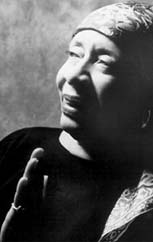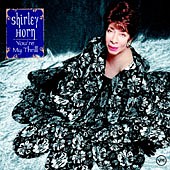

Courtesy
of Shirley Horn

Verve Records
A FIRESIDE
CHAT WITH SHIRLEY HORN
I remember the first time I heard Shirley Horn sing the Ray Charles favorite,
"You Don't Know Me" on her Light Out
of Darkness album on Verve, the lady friend that was with me adored it.
See, the ladies love ballads and Ms. Horn can hold a ballad like no one
else. She spoke with me from her home, the night before she was flying
out on tour, about her affinity for ballads and her relationship with
Miles Davis, unedited and in her own words.
FRED
JUNG: Let's start from the beginning.
SHIRLEY
HORN: I was born and raised in Washington D. C., I still live there. My
people all loved music. My grandmother was a self-taught musician who
played organ and piano. My mother and father just loved music and the
whole family. My grandmother told my mother when I was four years old,
told my mother to give me piano lessons because it was the only thing
that I wanted to do. I used to pick at her big old piano. I didn't want
to play with the kids or anything. She said, "Give this child lessons
because she's obviously interested in the music." So I had my first piano
lesson when I was four years old. I was just surrounded by good music
at home. Growing up, I heard jazz music, the best of the classics.
FJ:
What were you listening to?
SHIRLEY
HORN: Let's see, I heard Count Basie, and of course, Duke Ellington and
singers like Sarah Vaughan and Ella Fitzgerald, all the singers.
FJ:
How did you go from playing the piano to singing on stage?
SHIRLEY
HORN: Well, I was playing in a dining room. I would play a couple of hours
in the evening and there was an elderly gentleman who would come everyday,
even for dinner. He never said anything to me. He would tip his hat after
dinner and leave. It was getting close to Christmas time and he came in
and he sent a note to the piano and it said, "If you sing 'Melancholy
Baby,' this teddy bear is yours." The teddy bear was as tall as I and
it was a beautiful turquoise teddy bear. I sang "Melancholy Baby."
FJ:
Did you know the song?
SHIRLEY
HORN: I knew these songs, a lot of songs because my mother was always
singing at home and I heard the classics of the jazz music. Yeah, that's
when I started singing. At that point, there was an older woman who kept
her arms around me. I was very young. She went to the owner and said,
"Well, she can sing, so she's got to get more money." And after that,
I joined the union. I got more money. I was very shy at the time, but
the idea of getting more money was interesting and I started to sing.
I've been singing ever since.
FJ:
Your thoughts on Miles Davis, whom you recorded a tribute entitled I Remember
Miles.
SHIRLEY
HORN: Well, I loved Miles so much. He got to be like a part of me. Of
course, I knew about him many years before actually. I met him, but I
was a married woman and I got a call. To this day, I don't know how he
got this phone number, but I was with my mother-in-law and my husband
down in Virginia having breakfast and this party said, "This is Miles
Davis. I want you to come to New York. There is some people, I think,
you should get to know." And I thought it was somebody, some friends playing
a joke or something. So I thought about it and I thought that maybe I
should go to New York. I told my husband and I did come to New York. I
went to his house and truly there were a lot of people that I needed to
know and he let me know that this was for real. He had four, five young
kids at that time and they were all singing music from my first album.
These little kids were just singing. Miles cared about me. He never liked
the idea that I smoked. He was always kind of an overseer. "You can't
sit on the bar. Ladies don't sit on the bar." He would tell me not to
associate with this person or with that person or eating the wrong food.
When I was in New York, I was alone and eating fast food and he would
push good food. At one time, I got a little heavy and I used to go to
his house and workout in his basement. He was like a dear uncle.
FJ:
So he wasn't too successful implementing a stop smoking campaign.
SHIRLEY
HORN: It got to a point where I would sneak and smoke behind him.
FJ:
And the standard by which all female vocalists are measured, Ella Fitzgerald.
SHIRLEY
HORN: I have the greatest respect for her. I don't know that she had that
much influence. My influences ran to maybe Peggy Lee, Billie Holiday.
What I heard at home, Sarah Vaughan, Carmen McRae. She was wonderful.
She was a queen. She was really the queen. What can you say about her?
What can be said about her?
FJ:
You are one of the preeminent interpreters of the ballad, is there a technique
to singing a ballad well?
SHIRLEY
HORN: Well, are you going to ask me why I sing them so slow? Is that coming
up?
FJ:
Boy, you spotted me coming down the road a mile away.
SHIRLEY
HORN: (Laughing) Well, I'm trying to paint a picture. I sing what I feel
and I am trying to paint this picture. I want you to see what I am seeing.
I don't speak quickly. I am kind of slow. I take things slowly. You ought
to hear about my drummers talk about how I pay, I take my time (laughing).
But, I sing what I feel. Let's talk about the lyric. Where does the lyric
take me? What does the lyric say? What is the story? I try to paint the
picture of that story. What do the lyrics say? That is what I look at
first, the lyric and then the melody.
FJ:
Let's touch on your upcoming project.
SHIRLEY
HORN: Well, I'm going to do something, in fact, next week I am going to
New York to get started. I am doing some things with my trio and I will
be joined by Johnny Mandel. That is going to happen next week. The trio
and I will go down, go down and lay down some patterns and then Johnny
will join us in California.
FJ:
Give me a tune that will be on the album.
SHIRLEY
HORN: We just had a rehearsal yesterday. We're going to do a ballad called
"The Very Thought of You." That is one song that I really, really, really
like. It is going to be pretty tunes and couple of kind of bumpy tunes.
FJ:
And the release date?
SHIRLEY
HORN: This later in the fall.
FJ:
You still spend a significant amount of time touring.
SHIRLEY
HORN: Oh, yeah. This year from June 2, I'm going to be busy, busy, busy.
We are going to Canada and of course we are doing San Francisco and Seattle.
We are doing the festivals. I think we're going to France. I am trying
to slow down a bit. It got pretty hectic last year. It was a little impossible.
It was too much. And my drummer who is much younger than I asked, "When
are we going to take a rest?"
FJ:
What motivates you to take on such a rigorous schedule?
SHIRLEY
HORN: It is hard to stay home for two weeks. I get antsy and I need the
audience. I need to hear it and to be with my guys. "Come on, come on,
let's play. Let's be together." I have to have the music. It's a drag,
Fred. I hate to travel. Traveling is really hard. It is almost impossible
now. I am trying now to do the same hotels and I am doing pretty well
with that, but the traveling is pretty rough.
FJ:
Any regrets?
SHIRLEY
HORN: No. No. No. Nope.
FJ:
Makes it easy to get up in the morning.
SHIRLEY
HORN: Afternoon, late evenings (laughing).
Fred
Jung is the Editor-In-Chief and is starring in his own summer sequel.
Comments? Email him.